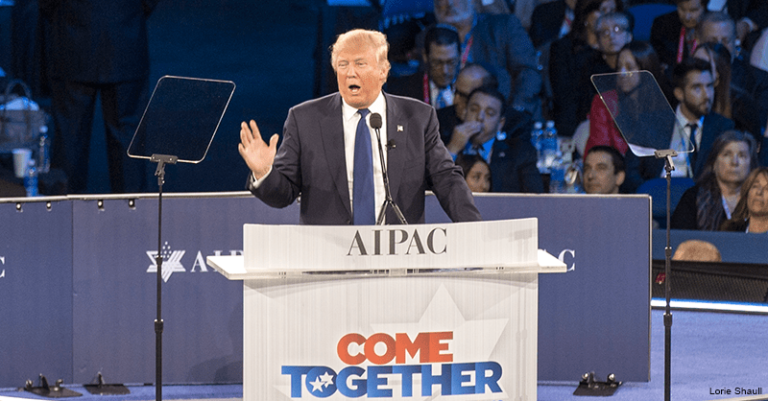
The month of March in Washington DC is known for cherry blossom and AIPAC’s annual conference. From 4-6 March, the 2018 AIPAC policy conference took place in DC attracting more than 18,000 Americans from around the country.
The American Israel Public Affairs Committee (AIPAC) is the main pro-Israel lobby in the United States and one of the most influentiallobbying groups in Washington.
While AIPAC usually attracts participants from both sides of the aisle, this year’s gathering in particular seemed to be the year of outreach for the organisation. From Republican and Democratic officials, to the think tank community and democracy activists, to clowns and even the foreign minister of Togo, AIPAC is increasingly aware of the PR challenges ahead.
Yet, no other place in the United State attracts the biggest names in politics and presidential and congressional hopefuls, and where Republicans and Democrats agree for once. Anyone interested in a political career is sure to be there.
Traditionally, AIPAC is known to make or break politicians and political candidates in the United States. Although many of them may not have any interest in or knowledge about Israel, they know too well that supporting Israel and voting with AIPAC is career security and they know better than to upset this powerful lobby and commit political suicide.
With increased awareness of the negative effects of lobbying groups and the rise of progressive voices among Democratic voters, is AIPAC’s reign beginning to weaken?
A dwindling support base
Despite the love fest between AIPAC and members of US congress, AIPAC is increasingly struggling, especially among young and progressive populations.
While the organisation is proud of its bipartisan base, support for Israel in the Democratic party is changing. Some report that AIPAC has been increasingly struggling to hold the traditional bipartisan support it has enjoyed among the American public.
A recent poll by Pew Research shows support for Israel among Democrats at an all times low; 27 percent of Democrats sympathise more with Israel while 25 percent sympathise more with the Palestinians, compared to 76 percent of Republicans who support Israel.
Among American Jewish college students, support for Israel dropped 27 percent between 2010 and 2016, according to a study by Brand Israel Group (BIG).
Additionally, the American mainstream and Jewish media have started to questions AIPAC’s loyalty and agenda. Some argue that young liberals and progressive Jews can no longer support Israel over their opposition to the occupation, while others have criticised AIPAC’s treatment of the press and restrictions placed on journalists.
Some more liberal media outlets point to the hypocrisy of members of Congress in their championing of equality and progressive agendas while blindly supporting Israel’s occupation (the term PEP – Progressive Except for Palestine is used to describe these public figures).
AIPAC President Mort Fridman understands this growing resentment too well. He opened this year’s conference with an appeal to progressive Jews to return to the movement.
“To my friends in the progressive community, I want you to know we are partners in this project” he said, “there are very real forces trying to pull you out of this hall and out of this movement and we cannot let that happen – we will not let that happen!”
It is argued that a united Jewish front in the United States has been the glue holding the Israel lobby’s influence over US politics. With the shift among liberal youth, progressive Jews, and democrats toward Israel and AIPAC, whether the Israel lobby will continue to act as gatekeeper and approve American politicians based on their support for Israel and Israel’s agenda seems to be changing, albeit slowly.
Legislators rush to please AIPAC
This year’s lineup at AIPAC featured high level administration officials including Vice President Mike Pence, Ambassador Nikki Haley, Ambassador David Friedman, Ambassador Mark Green of USAID, and Brian Hook from US State Department. On the legislative side, at least 35 members of the US Congress flocked in from both sides of the aisle, to show their unwavering support for Israel.
Legislators present and speaking at AIPAC did not let facts stand in the way of their political agenda. Prominent Democrats competed with the Trump Administration over support for Israel’s far right policies and agenda, perpetuating falsehoods and hawkish rhetoric.
Senator Chuck Schumer from New York (the largest recipient of AIPAC financing) took the liberty to distort history, blame the failure of the peace process on Palestinians’ not believing the Jewish Torah, insisting that the settlements are not the problem.
Progressive Democrat Senator Kamala Harris from California, one of the likely Democratic contenders for the 2020 presidential bid, gave an off-the-record speech at AIPAC reportedly stressing the need for “strong US-Israel partnerships” and reiterating that “Israel made the desert bloom”.
More than being seen, legislators rush to implement AIPAC’s agenda. The AIPAC 2018 Issue of Backgrounder, which represents the organisation’s policy agenda in the United States focuses on three main items; aid for Israel, fighting the Iran nuclear deal and toughening sanctions against the Islamic Revolutionary Guard Corps (IRGC), and criminalising boycott and what they call the “anti-Israel UN bias”.
Almost on cue, Representatives Ileana Ros-Lehtinen and Ted Deutch, introduced a bill to codify into law the 10-year MOU giving $38 billion in aid to Israel and reaffirm US commitment to maintaining Israel’s qualitative military edge.
Upon their return from Israel, Senators Lindsey Graham and Chris Coons called for increasing US aid to Israel beyond the annual $3.8 billion. Graham is also the architect of the Taylor Force Act passed recently by Congress and signed by President Trump as part of the omnibus government spending bill. On Iran, Representatives Ed Royce and Eliot Engel responded to AIPAC’s demand by introducing a bill to impose additional sanctions related to the IRGC.
Regarding boycotting Israel, Senator Benjamin Cardin’s Israel Anti-Boycott Act which has 55 cosponsors, directly addresses AIPAC’s concerns of UNHRC’s Israel boycott resolution and prohibits Americans from supporting the boycott.
Unsurprisingly, many of these sponsors and co-sponsors of the bills are on the recipient lists of AIPAC and related pro-Israel campaign financiers including mega-donors like Sheldon Adelson (the largest single contributor to political campaigns.
With 35 Senate seats and all 435 House seats up for reelection in the 2018 midterm elections, members of Congress and 2020 presidential hopefuls took the opportunity to toe the AIPAC line and made sure to be seen at AIPAC.
Legal challenges and FARA
The biggest (and perhaps the only) challenger to AIPAC so far has been the US constitution. The Israel Anti-Boycott Act while it enjoys plenty of cosponsors and great support in Congress, has been facing an uphill battle, being challenged by the ACLU and other activists for being unconstitutional.
In recent months, members of Congress have had to answer some tough questions about the bill from their constituents, especially in the democratic party. For example, Senator Kirsten Gillibrand from New York withdrew her sponsorship of the bill after being confronted by activists who called out her support for the bill as unconstitutional and a violation of the first amendment.
The bill saw several amendments and revisions due to widespread criticism and concern. Although members of Congress are still pushing for an amended version of the act, it is not clear what version might be passed and what purpose the final bill would serve after extensive amendments.
A more direct legal challenge facing AIPAC involves calls for AIPAC to register as a foreign agent with FARA.
The Foreign Agent Registration Act (FARA) requires organisations that represent the interests of foreign governments before Congress, the White House and the federal government to disclose their activities and finances, in order to protect American interests from foreign influence.
When members of Congress are considering a bill that requires al-Jazeera to register as a foreign agent (and with it taking restriction on freedom of the press to a new low), it is absurd that an organisation like AIPAC is not required to file with FARA.
But FARA’s selective enforcement is nothing new.
A 2011 report details how Israel lobby groups have repeatedly subverted FARA while others have been forced to register. The American Zionists Council (AZC) and its reincarnation AIPAC fought several legal attempts.
In the organisation’s first years, it faced intense opposition from President Eisenhower which ultimately led to its recreation as AIPAC.
In 1962, an awareness that AIPAC was an arm of the Jewish Agency for Israel (which was involved in smuggling arms to Jewish militias in Palestine) and acting on Israel’s behalf, led the attorney general to order the organisation to register as a foreign agent, but the order was withdrawn by the Department of Justice.
In the 1960s and 70s, Senator William Fulbright and then in the 1980s CIA’s Victor Marchetti led unsuccessful investigations and campaigns to require the FARA registration.
A more prominent case in 2005 against AIPAC senior employees Steven Rosen and Keith Weissman and Pentagon employee Larry Franklin, investigated the passing of US government secrets to Israeli officials, but this case was also dismissed.
While AZC was at one point early on asked by the Department of Justice to file a non-public FARA registration summary statement, its lobbying director Isaiah Kenan almost immediately recreated the organisation and registered it as a separate lobbying agency, thus replacing it with AIPAC.
AIPAC’s founder then used a loophole in the law, defining AIPAC as a lobby on behalf of Americans who support Israel and not on behalf of Israel, thus allowing AIPAC to legally engage in lobbying politicians without revealing its activities and finances.
Thus far, AIPAC has been successful in using its political power not only to influence American politics but to push against any requirement for FARA registration.
But AIPAC’s continued freedom to censor politicians and political spheres on behalf of Israel ultimately goes against US interests. Its unchecked influence over all branches of the US government essentially makes US elected officials put Israel’s agenda and interests (which happen to be far-right, fascist, and in violation of human rights and international law) above the United States’ own interests and values.
Some may argue that this scenario is unsustainable. But despite declining support for Israel among young Jews and progressives, the AIPAC annual conference is still the place to be seen.
While critical voices and calls for AIPAC to register with FARA are beginning to be heard, the United States government has been known to enforce FARA only with governments it does not favour and it is unlikely that material evidence can be provided to demonstrate AIPAC’s loyalty to the Israeli government. As such, it seems unlikely that any legislation will take place anytime soon.
In the Democratic party however, the shifting constituency means Democrats can no longer get away with the hypocrisy of supporting progressive agendas based on justice and equality while blindly supporting an oppressive government in Israel.
Some figures from the left wing of the Democratic Party know that too well. For example, Kirstin Gillibrand and Cory Booker who are rumored to be considering a presidential run in 2020, did not appear at AIPAC this year, although they are sure not to voice public criticism of Israeli policies as this is still a political taboo.
There are signs that the powerful Israel lobby and AIPAC are facing an uphill battle, but whether their influence will weaken as the midterms in 2018 and the presidential elections in 2020 approach, remains to be seen.
This paper was published by The New Arab on April 3, 2018.

